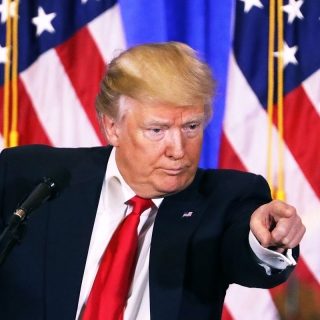


President Donald Trump announced the first in a series of letters threatening higher tariffs on major trading partners, including 25% tariffs on goods from Japan and South Korea, and signed an executive order delaying the new duties until Aug. 1.
Trump also announced 25% tariffs on Malaysia, Kazakhstan and Tunisia, while South Africa will face 30% tariffs and Laos and Myanmar will face 40% tariffs. Other countries hit with tariffs include Indonesia with 32% tariffs, Bangladesh with 35% tariffs, and Thailand and Cambodia with 36% tariffs. Bosnia received 30% tariffs, while Serbia faced 35% tariffs.
The countries were the first in what the president promised would be a series of unilateral warnings and trade deals announced on Monday, two days before an agreement is due from trading partners facing so-called reciprocal levies on April 2.
"Our relationship is, unfortunately, far from Reciprocal," Trump wrote in the letter. On Monday, he signed an executive order delaying new tariffs until Aug. 1 for all countries facing reciprocal tariffs, effectively giving each affected country an extra three weeks to work out a deal with the White House.
His rush to overhaul U.S. trade policy in his second term has been a steady source of uncertainty for markets, central bankers and executives trying to work out the impact on production, inventories, hiring, inflation and consumer demand — routine planning that is difficult enough without the costs of tariffs that go into effect one day and are gone the next.
The letters so far appear to be largely a new method of once again delaying the looming July 9 deadline for so-called "reciprocal" tariffs until at least early August. Most of the tariffs, shared on his Truth Social platform, are largely in line with what Trump has already announced countries will face. White House Press Secretary Karoline Leavitt said about a dozen countries would receive notice of their tariffs on Monday directly from the president.
More letters will arrive in the coming days, he said. The episode was the latest twist in a program that has roiled markets and trade around the world. A week after announcing the tariffs at a Rose Garden event, Trump offered a 90-day reprieve, lowering tariffs to 10% to allow time for negotiations. Few countries have been able to negotiate deals in the short time allotted.
Meanwhile, Trump announced framework agreements with the U.K. and Vietnam and a trade truce with China. At the same time, Trump warned countries against retaliating against his latest moves. "If for any reason you decide to increase Tariffs, then, whatever amount you choose to increase them will be added" to the threatened levels, Trump wrote. (alg)
Source: Bloomberg
Japan's annual inflation rate edged down to 2.9% in November 2025 from October's 3-month high of 3.0%. Core inflation stood at 3.0%, keeping the same pace as in October and aligning with estimates. Mo...
Goldman Sachs sees gold prices climbing 14% to $4,900 per ounce by December 2026 in its base case, it said in a note on Thursday, while citing upside risks to this view due to a potential broadening o...
The BRICS group of countries is increasingly being considered as an alternative for global diplomacy and cooperation amidst increasing tariff and protectionist policies from the United States. A numbe...
Applications for US unemployment benefits fell after a spike in the previous week, underscoring the choppy nature of the data at this time of year. Initial claims decreased by 13,000 to 224,000 ...
Annual inflation in the United States (US), as measured by the change in the Consumer Price Index (CPI), fell 2.7% in November, according to a report by the US Bureau of Labor Statistics (BLS) on Thur...
Oil prices are headed for a second weekly decline as concerns over a growing oversupply outweigh geopolitical risks to supply. Brent crude edged up to $60 a barrel on Friday but is still down about 2% for the week, while West Texas Intermediate is...
President Vladimir Putin said he is willing to discuss ending Russia's war in Ukraine, despite rejecting changes sought by Kyiv and Europe to the U.S. peace plan drafted with Moscow. Putin said he has "practically agreed" to the proposals to end...
Gold prices fell slightly on Friday (December 19), pressured by a stronger dollar and year-end investor positioning, but are poised to end the week higher as weaker US inflation data raised speculation of an interest rate cut. Spot gold prices...
 Fed Governor Christopher Waller said Wednesday that the Fed is in no rush to cut interest rates, given the current outlook, according to...
Fed Governor Christopher Waller said Wednesday that the Fed is in no rush to cut interest rates, given the current outlook, according to...
 The Bank of Japan (BOJ) is expected to raise interest rates on Friday to a three-decade high, from 0.5% to 0.75%, signaling readiness for further...
The Bank of Japan (BOJ) is expected to raise interest rates on Friday to a three-decade high, from 0.5% to 0.75%, signaling readiness for further...
 Stocks fell slightly on Tuesday as traders digested the delayed release of the November's jobs report.
The S&P 500 fell 0.1%, while the Nasdaq...
Stocks fell slightly on Tuesday as traders digested the delayed release of the November's jobs report.
The S&P 500 fell 0.1%, while the Nasdaq...
 European stocks closed lower on Tuesday, with the STOXX 50 down 0.5% and the broader STOXX 600 slipping 0.4%, as optimism around Russia–Ukraine...
European stocks closed lower on Tuesday, with the STOXX 50 down 0.5% and the broader STOXX 600 slipping 0.4%, as optimism around Russia–Ukraine...